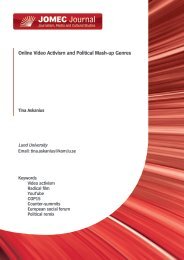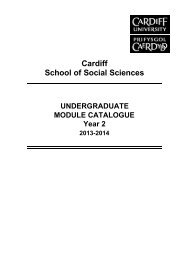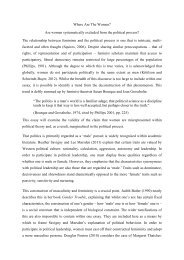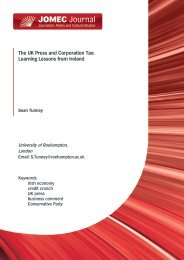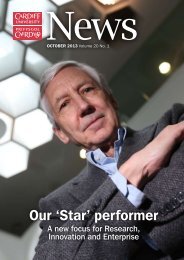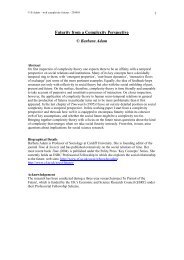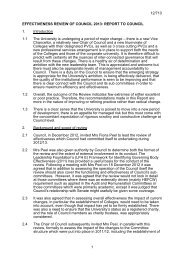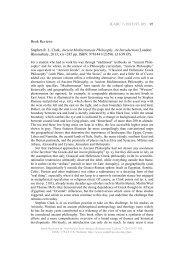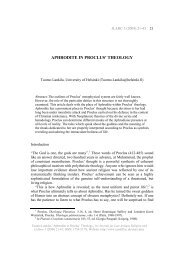Public Perceptions of Climate Change and ... - Cardiff University
Public Perceptions of Climate Change and ... - Cardiff University
Public Perceptions of Climate Change and ... - Cardiff University
Create successful ePaper yourself
Turn your PDF publications into a flip-book with our unique Google optimized e-Paper software.
Introduction<br />
Background<br />
<strong>Climate</strong> change is arguably the greatest challenge the world is currently facing. The threats<br />
posed by climate change calls for strong action from the international community to limit<br />
Greenhouse Gas (GHG) emissions. Both UK <strong>and</strong> Japan Governments have set themselves<br />
ambitious long-term domestic targets that go well beyond the Kyoto Protocol. The UK<br />
<strong>Climate</strong> <strong>Change</strong> Act 2008 provides a legally binding target <strong>of</strong> an 80% reduction in GHG<br />
emissions by 2050, with an interim target <strong>of</strong> 34% by 2020. Japan’s policy is to achieve an<br />
emission reduction <strong>of</strong> 25% by 2020 <strong>and</strong> 80% by 2050. These targets necessitate<br />
fundamental changes to the way energy is used <strong>and</strong> produced, <strong>and</strong> are unlikely to be met<br />
without widespread engagement <strong>and</strong> approval from the general public. Not only does the<br />
public need to personally change their behaviour in order to reduce energy consumption <strong>and</strong><br />
to comply with wider policies aimed at motivating these changes, they also need to accept<br />
new low-carbon technologies <strong>and</strong> facilities to de-carbonise their energy use (Spence &<br />
Pidgeon, 2009).<br />
Within this context, nuclear power has in recent years been promoted as a low-carbon<br />
technology that may help to mitigate climate change <strong>and</strong> at the same time increase energy<br />
security (Bickerstaff et al., 2008). While arguments regarding the role <strong>of</strong> nuclear power in<br />
delivering a secure supply <strong>of</strong> energy have been made since the oil crises in the 1970s, it is<br />
only since the early 2000s that nuclear power has been framed explicitly as a means to<br />
address climate change (Pidgeon et al., 2008). Over the last decade various industry <strong>and</strong><br />
government actors in the UK, as well as a number <strong>of</strong> prominent environmentalists, including<br />
James Lovelock (2004) <strong>and</strong> George Monbiot (2009), have expressed support for new<br />
nuclear built to help combat climate change. Previous studies suggest that this reframing<br />
argument has resulted in some changes in public attitudes towards nuclear power over the<br />
past decade. A significant proportion <strong>of</strong> the British public is now willing to ‘reluctantly accept’<br />
nuclear power as a means <strong>of</strong> addressing the greater threat <strong>of</strong> climate change (e.g. Pidgeon<br />
et al., 2008; Corner, et al., 2011). However, while the public is willing to consider the nuclear<br />
option, it is not embraced wholeheartedly. It has therefore been suggested that this<br />
‘conditional support’ is fragile. Pidgeon et al. (2008) argued that, in the absence <strong>of</strong> any major<br />
accident since Chernobyl, the public may have become less attentive to the risks <strong>of</strong> nuclear<br />
power, <strong>and</strong> that latent concerns are likely to re-emerge in case <strong>of</strong> major accident, possibly<br />
amplified with considerable force.<br />
Nuclear energy has for a long time been a national strategic priority in Japan <strong>and</strong> was one <strong>of</strong><br />
the main pillars <strong>of</strong> Japan’s policy to achieve future carbon emission reductions. The 2010<br />
Strategic Energy Plan committed to radical reductions in GHG emissions through<br />
investments in renewable energy, the promotion <strong>of</strong> energy conservation, <strong>and</strong> an ambitious<br />
expansion <strong>of</strong> Japan’s nuclear energy generating capacity from 26% in 2010 to nearly 50% in<br />
2030 (Cyranoski, 2012). However, the accident at the Fukushima Dai-ichi nuclear power<br />
plant that followed the devastating Great East Japan earthquake <strong>and</strong> tsunami on the 11 th <strong>of</strong><br />
March 2011 has thrown nuclear power as a publicly acceptable energy technology into doubt.<br />
5




